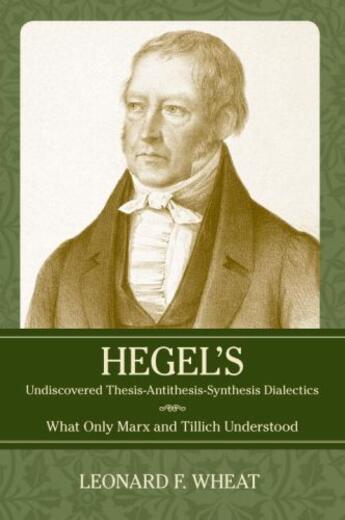-
Nombre de pages : (-)
-
Collection :
(-)
-
Genre :
(-)
-
Thème :
Non attribué
-
Prix littéraire(s) :
(-)
Résumé:
For over fifty years, Hegel interpreters have rejected the former belief that Hegel used thesis-antithesis-synthesis dialectics. In this incisive analysis of Hegel's philosophy, Leonard F. Wheat shows that the modern interpretation is false. Wheat rigorously demonstrates that there are in fact... Voir plus
For over fifty years, Hegel interpreters have rejected the former belief that Hegel used thesis-antithesis-synthesis dialectics. In this incisive analysis of Hegel's philosophy, Leonard F. Wheat shows that the modern interpretation is false. Wheat rigorously demonstrates that there are in fact thirty-eight well-concealed dialectics in Hegel's two most important works-twenty-eight in Phenomenology of Spirit and ten in The Philosophy of History. Wheat also develops other major new insights:
- Hegel's chief dialectical format consists of a two-concept thesis, a two-concept antithesis, and a two-concept synthesis that borrows one concept from the thesis and one from the antithesis.
- All dialectics are analogically based on the Christian separation-and-return myth: the dialectic separates from and returns to a thesis concept.
- Hegel's enigmatic Spirit is a four-faceted, deliberately fictitious, nonsupernatural entity that exists only as an atheistic redefinition of "God." - Spirit's "divine life" begins not with consciousness but with unconsciousness, in the prehuman state of nature-before Spirit acquires its human mind.
- Hegel's concept of freedom is not a sociopolitical concept but release from bondage to religious superstition (belief in a supernatural God).
- In Hegel's widely misinterpreted master-and-slave parable, the master is God, the slave is man, and the slave's gaining his freedom is man's becoming an atheist.
- The standard non-Hegelian base-superstructure interpretation of Marx's dialectics is false. Marx's basic dialectic is actually this: thesis = communal ownership poverty, antithesis = private ownership wealth, synthesis = communal ownership wealth.
Wheat also shows that Marx and Tillich, who subtly used Hegelian dialectics in their own works, are the only authors who have understood Hegelian dialectics.
Thoroughly researched and exhaustive in detail, this radical reinterpretation of Hegel's philosophy should greatly interest Hegel scholars and students.
Donner votre avis














